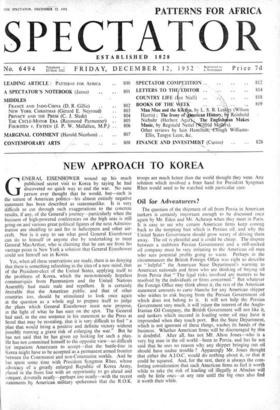NEW APPROACH TO KOREA
GENERAL EISENHOWER wound up his much publicised secretvisit to Korea by saying he had discovered no quick way to end the war. No sane person ever thought that he would, but—such is the nature of American politics—his almost entirely negative statement has been described as statesmanlike. It is very difficult to cut through such exaggerations to the concrete results, if any, of the General's journey—particularly when the business of high-powered conferences on the high seas is still going on and various great political figures of the next Adminis- tration are shuttling to and fro in helicopters and other air- craft. Nor is it easy to see what good General Eisenhower can do to himself or anyone else by undertaking to meet General MacArthur, who is claiming that he can see from his vantage point in New York a solution that General Eisenhower could not himself see in Korea.
Yet, when all these reservations are made, there is no denying that there is something refreshing in the idea of a new mind, that of the President-elect of the United States, applying itself to the problems of Korea, which the monotonously hopeless communiqués from Panmunjom and the United Nations Assembly had made stale and repellent. It is certainly desirable that the American public. and that of other countries too, should be stimulated to look once again at the question as a whole and to prepare itself to judge the' plans which General Eisenhower must now propose, in the light of what he has seen on the spot. The General had said, in the one sentence in his statement to the Press at Seoul that may be revealing, that it is very difficult to find " a plan -that would bring a positive and definite victory without possibly running a grave risk of enlarging the war." But he has not said that he has given up looking for such a plan. He has not committed himself to the opposite view—so difficult for impatient Americans to accept—that the battle-line in Korea might have to be accepted as a permanent armed frontier between the Communist and non-Communist worlds. And he has spent some time with President Syngman Rhee, whose advocacy of a greatly enlarged Republic of Korea Army, placed in the front line with an opportunity to go ahead and conquer, dovetails neatly—perhaps too neatly—with the recent statements ,by American military spokesmen that the R.O.K. troops are much better than the world thought they were. Any solution which involved a freer hand for President Syngman Rhee would need to be watched with particular care.


































